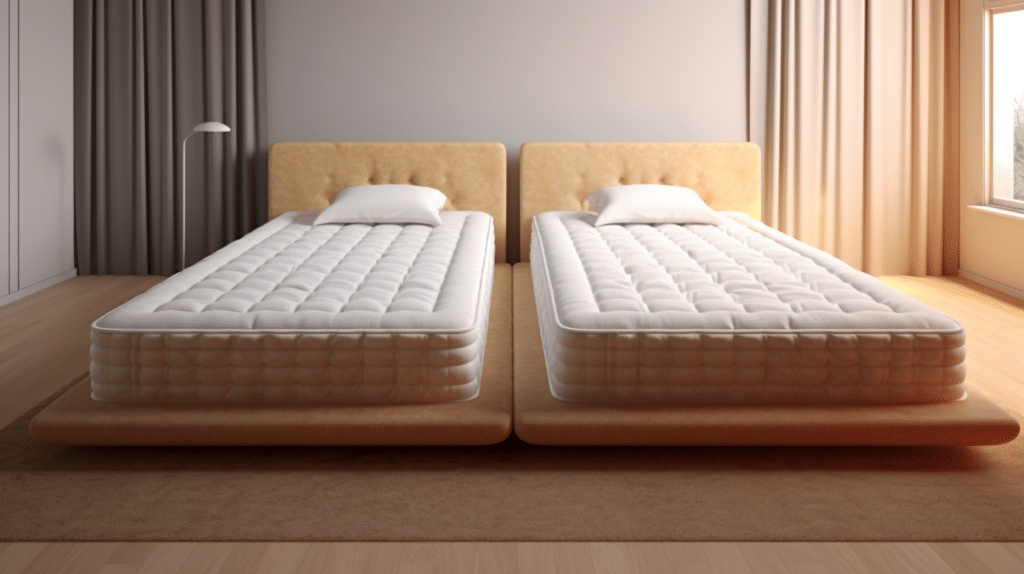Are you in the market for a new mattress? If so, understanding the role of coil count is crucial in determining its quality. The number of coils in a mattress directly impacts its support, comfort, and durability. In this article, we will explore the benefits of higher coil counts, considerations when choosing the right count for you, and debunk common misconceptions surrounding coil count. By the end, you’ll have all the information needed to make an informed decision about your next mattress purchase.
Understanding Coil Count in Mattresses
Understanding coil count in mattresses is important when determining the overall quality. The coil count refers to the number of coils or springs inside a mattress. It plays a crucial role in providing support and comfort while you sleep. The higher the coil count, the more support you can expect from your mattress. A higher coil count means that there are more individual coils evenly distributed throughout the mattress, which helps to distribute your body weight and relieve pressure points. This leads to better spinal alignment and reduces the chances of waking up with aches and pains. So, when shopping for a new mattress, be sure to pay attention to the coil count as it directly affects how well you’ll sleep at night and wake up refreshed in the morning.
Benefits of Higher Coil Count
Benefits of a higher coil count in a mattress include improved support and increased durability. Here are three key reasons why a higher coil count is beneficial:
- Enhanced Support: A higher coil count means more coils throughout the mattress, which leads to better weight distribution and spinal alignment. This can help alleviate pressure points and reduce the risk of discomfort or pain.
- Increased Durability: With more coils, the mattress becomes sturdier and less prone to sagging over time. This means your investment will last longer, providing you with optimal comfort and support for years to come.
- Better Motion Isolation: Higher coil counts often result in better motion isolation, meaning that movements on one side of the bed are less likely to disturb your partner on the other side. This can lead to a more peaceful night’s sleep for both of you.
The benefits of a higher coil count cannot be overstated when it comes to choosing a quality mattress. By prioritizing this important factor, you can ensure improved support, increased durability, and ultimately enjoy a better night’s sleep overall.
Considerations When Choosing Coil Count
When choosing a mattress, you should take into account the factors that can affect the coil count. The importance of coil count cannot be overstated as it directly impacts the level of support and comfort provided by the mattress. Higher coil counts generally result in better support and reduced motion transfer, making them ideal for individuals who share their bed or those who suffer from back pain. However, it is important to note that coil count variations exist across different types of mattresses such as innerspring, pocketed coil, or hybrid mattresses. While higher coil counts are typically associated with superior quality, other factors like wire gauge and construction also play a crucial role in determining overall mattress performance. Therefore, when considering coil count, it is essential to strike a balance between personal preferences and individual needs for optimal sleep experience.
Finding the Right Coil Count for You
Finding the right coil count for you can greatly impact the level of support and comfort you experience while sleeping. When determining the perfect firmness, consider your personal preferences and body type. Here are three key factors to consider when finding the right coil count:
- Body Weight: Heavier individuals may require a higher coil count for optimal support and durability.
- Sleeping Position: Different sleeping positions exert varying pressure on different areas of your body. Side sleepers may benefit from a higher coil count to alleviate pressure points, while back sleepers may prefer medium-firm mattresses with moderate coil counts.
- Benefits of Different Mattress Materials: Coil counts work in conjunction with mattress materials such as memory foam or latex. Each material provides unique benefits like contouring support or cooling properties, so consider these factors when choosing your ideal coil count.
By finding the perfect combination of firmness and mattress materials, you can ensure a restful night’s sleep tailored to your specific needs.
Other Factors to Consider for Mattress Quality
When it comes to mattress quality, there are several other factors that you should consider. First, the materials and construction of the mattress play a significant role in determining its overall comfort and durability. Additionally, brand reputation and warranty can give you confidence in your purchase, ensuring that you’re investing in a reliable product. Lastly, your price range and budget will also influence your decision-making process, as it’s important to find a mattress that meets both your needs and financial constraints.
Mattress Materials and Construction
To understand mattress quality, you should consider the materials and construction used. When it comes to durability and support, the materials and construction of a mattress play a crucial role. Different types of mattresses may use various materials such as memory foam, latex, or innerspring coils. Memory foam mattresses are known for their ability to contour to your body shape while providing excellent support. Latex mattresses offer similar benefits but with more bounce and responsiveness. Innerspring mattresses, on the other hand, use coil systems to provide support and distribute weight evenly. The number of coils in an innerspring mattress can affect its overall comfort and longevity. Generally, more coils mean better support and less motion transfer between sleeping partners. So when evaluating mattress quality, be sure to consider the materials used and how they are constructed for optimal durability and support.
Brand Reputation and Warranty
Brand reputation and warranty are important factors to consider when evaluating a mattress’s overall value. A brand with a good reputation is more likely to offer high-quality products and reliable customer service. Look for well-established brands that have been in the industry for a long time and have positive reviews from customers. Additionally, check if the brand offers a warranty for their mattresses. A warranty provides assurance that the manufacturer stands behind their product and is willing to address any issues that may arise. It is recommended to choose a mattress with a generous warranty period, preferably at least 10 years. This way, you can have peace of mind knowing that your investment is protected and you can enjoy your mattress for years to come.
Price Range and Budget
If you’re on a budget, consider the price range of mattresses available to find one that fits your needs. The price range of mattresses can vary greatly depending on factors such as brand reputation and mattress features. It’s important to keep in mind that higher prices don’t always guarantee better quality or comfort. When looking at different price ranges, also consider the lifespan of the mattress. Cheaper mattresses may have a shorter lifespan and require replacement sooner, while more expensive options might be built to last longer. Finding a balance between cost and durability is key when it comes to choosing the right mattress for your budget. Take your time to compare prices and read reviews before making a decision.
Maintaining and Caring for Your Mattress
Caring for your mattress includes regularly rotating it to ensure even wear. This helps to extend its longevity and maintain its shape and support. In addition to rotation, there are other important steps you can take to keep your mattress in top condition.
Here are some mattress maintenance tips:
- Use a mattress protector to prevent stains and spills.
- Vacuum your mattress regularly to remove dust, allergens, and dead skin cells.
- Air out your mattress by opening windows or using a fan to reduce moisture buildup.
- Avoid jumping on the bed as it can damage the coils and springs.
- Follow specific cleaning techniques recommended by the manufacturer for any spills or stains.
By following these simple care instructions, you can help prolong the lifespan of your mattress and ensure a comfortable sleep experience for years to come.
Common Misconceptions about Coil Count
When it comes to choosing a mattress, there are some common misconceptions about coil count that you should be aware of. First, higher coil count does not always mean better quality. While a higher coil count can provide more support, other factors such as the type of coils and padding also play a significant role in determining mattress quality. Second, it is important to understand that coil count is not the only important factor to consider when selecting a mattress. Factors such as coil gauge, durability, and comfort level also contribute to the overall quality of a mattress. Lastly, contrary to popular belief, coil count does not solely determine mattress firmness. In fact, different types of mattresses with the same coil count can vary in firmness due to variations in materials and construction techniques used.
Higher Coil Count Always Means Better Quality
Having a higher coil count doesn’t always guarantee better quality in a mattress. Many people assume that more coils automatically equal a more comfortable and supportive bed, but this is not always the case. Two factors to consider are coil count accuracy and coil count consistency.
Firstly, coil count accuracy refers to how accurately the manufacturer counts the number of coils in the mattress. Some companies may inflate their coil counts by including tiny micro-coils or even counting each individual turn of a continuous coil as a separate unit. This can give the illusion of a higher coil count, but it doesn’t necessarily translate into improved quality or comfort.
Secondly, coil count consistency is another important factor to consider. A mattress with a high overall coil count may still have areas with lower density or fewer coils, resulting in uneven support and potential discomfort.
In conclusion, while coil count can provide some indication of mattress quality, it’s essential to look beyond this number and consider other factors like construction materials and personal preferences when choosing the right mattress for you.
Coil Count is the Only Important Factor
Remember, there are various factors to consider when choosing the right mattress for you, and coil count is not the only important factor to consider. While coil count does play a role in determining mattress quality, it is not the sole indicator. Other factors such as coil gauge, coil type, and the quality of materials used also contribute to overall comfort and durability. Coil count alone cannot guarantee a good night’s sleep if these other factors are overlooked. Additionally, personal preferences like firmness level, body weight distribution, and sleeping position should be taken into account. So when shopping for a mattress, don’t just focus on coil count; consider all aspects that will impact your sleep experience.
Coil Count Determines Mattress Firmness
To determine the firmness of your mattress, consider the coil count as it directly affects how supportive and comfortable it will be for you. The coil count refers to the number of coils or springs inside the mattress. Generally, a higher coil count means a firmer mattress, while a lower coil count indicates a softer one. The more coils there are, the better the support your mattress can provide. This is because each coil helps distribute weight evenly and reduces pressure points on your body. Additionally, the impact of coil count on mattress durability should also be considered. A higher coil count usually means better durability and longer-lasting performance. So if you prefer a firmer and more durable mattress, paying attention to the coil count is crucial in making an informed decision about your sleep comfort.
Exploring Alternatives to Coil Mattresses
If you’re looking for alternatives to coil mattresses, there are various options available. While coil mattresses have their benefits, such as providing support and durability, some people prefer alternative choices for a variety of reasons. One popular option is memory foam mattresses, which conform to your body shape and relieve pressure points. These mattresses also absorb motion, making them ideal for couples or those who share a bed. Another alternative is latex mattresses, known for their natural materials and hypoallergenic properties. Latex provides excellent support and responsiveness while offering a cooler sleeping surface compared to memory foam. Additionally, hybrid mattresses combine the best features of both coils and foams, offering the perfect blend of support and comfort. So if you’re exploring alternatives to coil mattresses, consider these options to find the perfect fit for your sleep needs.
Understanding Mattress Certifications and Standards
Now that you have explored alternatives to coil mattresses, let’s dive into understanding mattress certifications and standards. It is essential to prioritize your safety and the environment when choosing a mattress. That’s why it’s crucial to familiarize yourself with mattress safety standards and eco-friendly certifications.
Mattress safety standards ensure that the materials used in mattress production meet specific criteria for fire resistance, chemical content, and durability. Look for certifications like CertiPUR-US or OEKO-TEX Standard 100, which guarantee that the mattress has been tested for harmful substances.
Eco-friendly mattress certifications, such as Global Organic Textile Standard (GOTS) or Global Organic Latex Standard (GOLS), indicate that the materials used are sourced sustainably and produced without harmful chemicals.
By understanding these certifications and standards, you can make an informed decision about purchasing a safe and environmentally friendly mattress.
Making an Informed Decision
When considering a new mattress, it’s important to educate yourself about different materials and their impact on your health and the environment. Making an informed decision involves making comparisons and understanding the features that are relevant to your needs. One important factor to consider is the coil count in determining mattress quality.
Coil count refers to the number of coils or springs within a mattress. Generally, a higher coil count indicates better support and durability. However, it’s essential to note that coil count alone does not guarantee comfort. Other factors like coil gauge (thickness) and construction materials also play a significant role.
To make an informed decision, compare mattresses with similar coil counts but different materials or construction techniques. Pay attention to features like foam layers, pillow tops, or cooling technology that can enhance comfort levels. By understanding these features and how they relate to your preferences, you can choose a mattress that suits your needs for both quality and comfort.
Conclusion
So there you have it – the role of coil count in determining mattress quality. Now that you understand how coil count affects the comfort and support of your mattress, you can make a more informed decision when choosing your next one. Remember to consider other factors like mattress material, certifications, and personal preferences as well. With all these considerations in mind, finding the perfect mattress for a good night’s sleep shouldn’t be too difficult. Sweet dreams!


